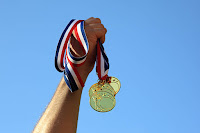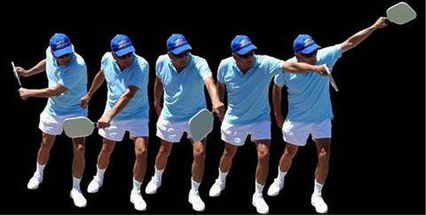The more disciplined you become, the easier pickleball gets...
Back in October, I wrote a post I thought was one of my most important. It was titled Pickleball PEP Talk - the Keys to Success and was intended to boil success down to its 3 most essential elements. PEP was an acronym for Positioning, Execution, and Patience. Today's post will expand on Positioning. But first, let's revisit that segment from the October article.
In my clinics, I use a golf analogy to illustrate the idea. A golfer positions his feet and body to make the same swing every time. It allows a swing that can be replicated to provide the same results again and again. It is also the swing that provides the most power and control.
Admittedly, a golf ball is stationary while a pickleball is moving. But that doesn't change the application of the principle. All it means is that getting into position takes more effort. A golfer can take a leisurely stroll and settle into his stance. Among other things, a pickleball player must judge where the ball is going, how fast it is moving, and how high it will bounce. Then he must determine where he needs to intersect the path of the ball to get his body positioned for a return. Even then, it is one thing to just hit the ball back. It is entirely another thing to hit the ball ball with your body positioned to make your natural swing. It takes a lot more effort.
But the results are worth the effort. As with golf, a natural swing provides more power and control. Over a year ago, I wrote what I consider one of my best articles - The Most Important Shot. A player's next shot determines how the rest of the rally is played out. How can the most important shot - the next one - be optimized? By maximizing power and control through the effort of proper positioning.
I would like to add one more comment to this discussion. A player's natural swing is a strength...up to a point. A more technically perfect swing is needed to compete at advanced levels as it gives the player more options. Therefore, a player whose natural swing is close to technical perfection has little adjustment to make. But a player who succeeds with a natural swing that strays from perfection is likely to be exposed as he advances.
The principle of a natural swing is simple. It is all about comfort zones - something I have talked a lot about in this blog, especially when targeting spots to take your opponents out of their comfort zone. The same theory can be reversed when thinking of yourself. Getting yourself into a position to take your natural swing is the ultimate comfort zone. That's a place you want to be.
Positioning
Positioning primarily refers to two issues - being in the right place on the court and getting your feet/body in the right place to hit the shot. Being in the right position on the court demands an understanding of several strategies including:
- The importance of controlling the NVZ line.
- Your position relative to your partner - proper court coverage.
- Your position relative to the ball - when to cover the middle vs. the alley.
- Forehands are generally better than backhands.
- Hitting within one's comfort zone results in better shots.
- A balanced shot allows for quicker recovery to a proper position.
Making the best shot is the single most important goal on every play. It sets the entire way the remaining rally plays out. Proper court positioning makes it easier to get your feet in the proper position to make the best shot.
I left something very important out of that section - something I discuss in my clinics. I believe that everyone has a natural swing. The swing that you took the first time you touched a paddle was likely your natural swing. You performed it without thought and used what felt comfortable. Ever since that day, your swing has been influenced by your mind as it adjusts your swing to fix mishits and misplays and to add others' technical advice.
In my clinics, I use a golf analogy to illustrate the idea. A golfer positions his feet and body to make the same swing every time. It allows a swing that can be replicated to provide the same results again and again. It is also the swing that provides the most power and control.
Admittedly, a golf ball is stationary while a pickleball is moving. But that doesn't change the application of the principle. All it means is that getting into position takes more effort. A golfer can take a leisurely stroll and settle into his stance. Among other things, a pickleball player must judge where the ball is going, how fast it is moving, and how high it will bounce. Then he must determine where he needs to intersect the path of the ball to get his body positioned for a return. Even then, it is one thing to just hit the ball back. It is entirely another thing to hit the ball ball with your body positioned to make your natural swing. It takes a lot more effort.
But the results are worth the effort. As with golf, a natural swing provides more power and control. Over a year ago, I wrote what I consider one of my best articles - The Most Important Shot. A player's next shot determines how the rest of the rally is played out. How can the most important shot - the next one - be optimized? By maximizing power and control through the effort of proper positioning.
I would like to add one more comment to this discussion. A player's natural swing is a strength...up to a point. A more technically perfect swing is needed to compete at advanced levels as it gives the player more options. Therefore, a player whose natural swing is close to technical perfection has little adjustment to make. But a player who succeeds with a natural swing that strays from perfection is likely to be exposed as he advances.
The principle of a natural swing is simple. It is all about comfort zones - something I have talked a lot about in this blog, especially when targeting spots to take your opponents out of their comfort zone. The same theory can be reversed when thinking of yourself. Getting yourself into a position to take your natural swing is the ultimate comfort zone. That's a place you want to be.





No comments:
Post a Comment